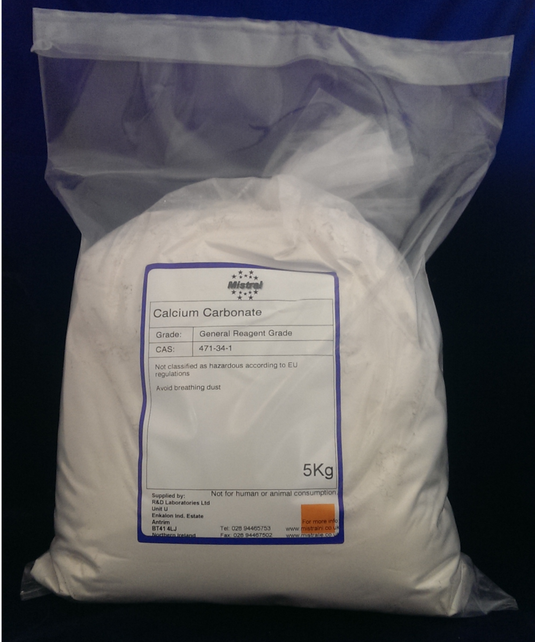CALCIUM CARBONATE
Technical / Industrial Grade
Calcium carbonate, commonly known as chalk or calcite is a non-combustible, non-toxic, odourless white powder with the formula CaCO3. It occurs naturally in the minerals aragonite, calcite, limestone and marble which makes up about 4% of the earths crust. Calcium carbonate is produced by the sedimentation of the shells of small fossilized eggs, skeletons, snails, shellfish, and coral over millions of years. Commercially the majority of calcium carbonate is produced from mining or quarrying and then grinding to different grades.
Calcium carbonate has an enormous range of applications and uses. These include usage in the construction and agriculture, as well as the plastics, glass, paint, paper, steel and oil industries.
PLEASE NOTE: This product is not for human or animal consumption.
Properties of calcium carbonate
- Synonyms: pulverised Limestone; chalk; calcite; french chalk, whiting;
- Formula: CaCO3
- CAS No: 471-34-1
- EINECS: 215-279-6
- Appearance: Fine white powder
- Density: 2.71 g/cm3
- Molar Mass: 100.09 g/mol
- Melting point: 825 C
- Solubility: very low solubility in water 0.15 g/100 mL
- Refractive index: 1.59
- pH: 9
Calcium carbonate reacts with strong acids to produce the salt of the acid and carbon dioxide gas. When heated above 825C it releases carbon dioxide leaving the calcium oxide, also known as quicklime. When calcium carbonate is dissolved in water saturated with carbon dioxide it produces a solution of calcium bicarbonate.
Uses For Calcium Carbonate
- Manufacture of lime and cement
- Line marking on sports pitches
- Purification of Iron from iron ore in a blast furnace
- Filtercake agent in drilling industry
- Added to drilling fluids to increase their density
- An extender in paints
- As a filler & extender in plastics industry
- Used in the manufacture of disposable nappies
- Manufacture of fillers, putty, adhesives and sealants
- Whiting in ceramics
- Manufacture of glass
- Used in the manufacture of paper
- pH corrector for alkalinity in swimming pools
- Manufacture of blackboard chalk
- Used as an abrasive in scouring creams and scouring powders
- In fertilisers as a source of calcium and stabilising soil acidity.
- As passive fire protection in hazardous environments.
- Source of alkalinity used for flue gas desulphurisation in power stations.
Calcium carbonate has a wealth of uses: as a flux in steel production and in processing of non-ferrous metals; in bricks, mortar and concrete for construction; as a raw material in glass; in the construction of roads and dams; in the manufacture of paper, paints and dyes, carpeting and other floor coverings; and in the treatment of water, industrial waste, gases and household refuse. It is also used to reduce soil acidity in agriculture.
How to use Chalk to Line mark sports pitches:
Chalk can be used to mark white lines on sports pitches. The product should be mixed 1 part chalk to between 3 and 4 parts water to form a slurry. Mix the chalk into the water with constant stirring to prevent lumps
